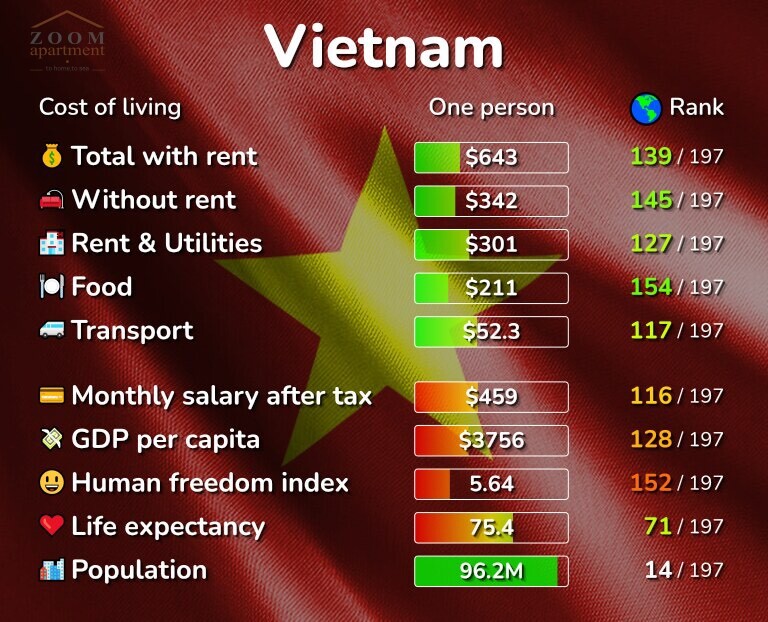
Why do so many foreigner choose moving to Vietnam?
Many foreigners chose moving to Vietnam for some pretty good reasons. It’s often cheaper to live here, the food is tasty, and the people are usually very friendly. Plus, there’s a lot of interesting culture and history to explore.

Top 5 reasons of moving to Vietnam from foreigners
Many foreigners choose to move to Vietnam for a variety of compelling reasons. Here are the top 5, explained simply:
Low Cost of Living: Your money can go much further in Vietnam compared to many Western countries or even other places in Southeast Asia. Rent, food, transportation, and entertainment are generally quite affordable. This means you can often enjoy a comfortable lifestyle on a smaller budget.
Delicious and Affordable Food: Vietnamese cuisine is world-famous for its fresh ingredients and flavorful dishes like pho and banh mi. Eating out is very cheap, especially local street food. Even restaurant meals are usually inexpensive, allowing you to enjoy a diverse culinary scene without spending a lot.
Friendly and Welcoming People: Vietnamese people are generally known for their hospitality and warmth towards foreigners. They are often curious, helpful, and have a strong sense of community. This can make it easier to settle in and feel at home.
Rich Culture and History: Vietnam has a long and fascinating history with influences from various cultures. There are many temples, historical sites, and traditional customs to explore. The country also boasts diverse and beautiful landscapes, from stunning beaches to mountains and rice paddies, offering plenty of opportunities for travel and adventure.
Job Opportunities: Vietnam’s economy has been growing steadily, creating job opportunities for foreigners, especially in fields like teaching English, IT, tourism, and skilled labor. While you’ll need the proper work permits and visas, it’s possible to find employment that offers a good standard of living relative to the cost of expenses.
In summary, Vietnam offers a combination of affordability, cultural richness, friendly people, delicious food, and increasing opportunities, making it an attractive destination for many foreigners looking for a new place to live.
Vietnamese culture – a mix of old traditions and new ways of life – 1st reason for moving to Vietnam

Family is Super Important: People in Vietnam often live close to their families, and taking care of older family members is a big deal. Respecting your elders is very important.
Community Matters: People often help each other out in their neighborhoods and villages. Being part of a group is important.
Respect and Politeness: Being polite is key. People often greet each other with a slight bow or nod. Showing respect, especially to older people, is very important.
Food is a Big Deal: Vietnamese people love to eat! Meals are often shared, and food is fresh and flavorful. Things like rice, noodles, and fresh herbs are common.
Festivals and Traditions: There are many colorful festivals throughout the year, often tied to the seasons or important historical events. These celebrations involve special foods, music, and activities.
Buddhism is Common: While there are other religions, Buddhism has a strong influence on Vietnamese culture and values. You’ll see temples and pagodas throughout the country.
Hard Work and Education: Vietnamese people often value hard work and education as ways to improve their lives.
Keeping Face: This means trying to avoid embarrassment for yourself and others. Being mindful of how your actions might affect someone’s reputation is important.
Vietnamese cuisine – fresh ingredients, flavorful combinations – 2st reason for moving to Vietnam

- Freshness is Key: Many dishes use fresh herbs, vegetables, and meats that are often sourced daily.
- Balance of Flavors: Vietnamese food aims for a balance of sweet, sour, salty, and spicy tastes.
- Lots of Herbs: A wide variety of fresh herbs like mint, cilantro, basil, and lemongrass are used to add aroma and flavor.
- Rice is a Staple: Rice in various forms (steamed, noodles, paper) is a fundamental part of most meals.
- Fish Sauce (Nước mắm): This salty, umami-rich sauce is a cornerstone of Vietnamese cooking, used for dipping and seasoning.
- Light on Oil: Generally, Vietnamese cooking uses less oil compared to some other Asian cuisines.
- Gluten-Free Friendly: Many dishes are naturally gluten-free as they rely on rice-based ingredients.
Common Ingredients:
- Rice: Steamed rice (cơm), rice noodles (bún, phở), rice paper (bánh tráng), sticky rice (xôi).
- Herbs: Mint (húng lủi, húng quế), cilantro (ngò rí), basil (húng quế, rau quế), lemongrass (sả), Vietnamese coriander (rau răm).
- Vegetables: Bean sprouts (giá đỗ), lettuce (xà lách), cucumber (dưa chuột), pickled carrots and daikon (đồ chua).
- Proteins: Chicken (gà), pork (heo), beef (bò), shrimp (tôm), fish (cá), tofu (đậu phụ).
- Sauces & Seasonings: Fish sauce (nước mắm), soy sauce (nước tương), chili (ớt), lime (chanh), sugar (đường), garlic (tỏi), shallots (hành tím).
Popular Dishes:
- Phở: A famous noodle soup with flavorful broth, rice noodles, herbs, and usually beef (phở bò) or chicken (phở gà).
- Banh Mi: A delicious sandwich on a baguette with various fillings like grilled pork, pate, pickled vegetables, and herbs.
- Goi Cuon (Spring Rolls): Fresh rolls filled with shrimp, pork, vermicelli noodles, and fresh herbs, often dipped in peanut sauce.
- Bun Cha: Grilled pork patties and pork belly served with cold vermicelli noodles, fresh herbs, and a dipping sauce (nước chấm).
- Banh Xeo: A crispy savory pancake made with rice flour, turmeric, coconut milk, shrimp, pork, and bean sprouts, served with fresh herbs and a dipping sauce.
See also:
Job opportunities and the cost of living – 2nd reason for moving to Vietnam

Here’s a breakdown of job opportunities and the cost of living in Vietnam for foreigners:
Job Opportunities for Foreigners in Vietnam:
Vietnam’s growing economy offers various job opportunities for foreigners.1 Some common sectors include:
- Teaching English: This remains a popular and relatively accessible option, especially in language centers and international schools.2 Native English speakers are in high demand.3
- IT (Information Technology): With Vietnam’s developing tech sector, there are opportunities in software development, web development, data analysis, and related fields.4
- Manufacturing and Engineering: Foreign professionals with technical skills are sought after in manufacturing, especially in international companies.5
- Hospitality and Tourism: As a popular tourist destination, Vietnam has job openings in hotels, resorts, and travel agencies, particularly for those with international experience and language skills.6
- Management and Specialist Roles: Multinational companies often hire foreigners for management positions, finance, marketing, and other specialized roles requiring international expertise.7
- NGOs and International Organizations: Opportunities exist in non-governmental organizations and international bodies working on various development and social projects.8
Where to Find Jobs:
- Online Job Portals: Websites like VietnamWorks, CareerLink, and Robert Walters Vietnam list job openings for foreigners.9
- LinkedIn: A valuable platform for networking and finding professional opportunities.10
- Recruitment Agencies: Several agencies specialize in placing foreign professionals in Vietnam.11
- Company Websites: Directly check the career pages of international companies operating in Vietnam.
Work Permit: For employment longer than three months, foreigners generally need a work permit.12 The employer usually assists with this process.
Cost of Living in Vietnam:

Vietnam is known for its relatively low cost of living which refers as one of reason for moving to Vietnam, especially compared to Western countries and many other parts of Southeast Asia.13 However, costs can vary significantly depending on your lifestyle and location (major cities like Ho Chi Minh City and Hanoi tend to be more expensive than smaller cities or towns).14
Here’s a general idea of monthly expenses (in USD):
- Accommodation:
- Apartment (1 bedroom): $400 – $900 (can be lower outside city centers)
- Room in a shared apartment: $150 – $300
- Utilities (electricity, water, internet, gas): $70 – $120
- Mobile Phone (with data): $3 – $10
- Groceries: $100 – $250 (depending on cooking habits and imported vs. local products)
- Eating Out: $200 – $500 (can be much lower if you primarily eat local food)
- Local street food meal: $1 – $3
- Mid-range restaurant meal: $5 – $15
- Transportation: $20 – $100 (can be higher if owning/renting a car; lower with motorbike or public transport)
- Motorbike rental: $40 – $60 per month
- Gas for motorbike: ~$10 per month
- Entertainment and Leisure: $100 – $300 (depending on activities)
- Housekeeping (if applicable): $50 – $200 (depending on frequency and size of accommodation)
Estimated Monthly Budget for a Single Expat:
- Budget-conscious: $700 – $1,000
- Mid-range lifestyle: $1,200 – $2,000
- Comfortable lifestyle: $2,000+
Key Factors Affecting Cost of Living:
- Location: Ho Chi Minh City and Hanoi are generally the most expensive. Smaller cities like Da Nang or Nha Trang can be more affordable.
- Accommodation: Rent is often the biggest expense. Living in central areas or modern apartments will cost more.
- Lifestyle: Eating out frequently at Western restaurants, importing goods, and engaging in expensive leisure activities will increase your expenses.
- Transportation: Owning a car is significantly more expensive than using a motorbike or public transport.
Overall, Vietnam offers a good quality of life at a relatively low cost, making it an attractive destination for many foreigners seeking new job opportunities and a more affordable lifestyle, and that’s the reason for their decision of moving to Vietnam.
